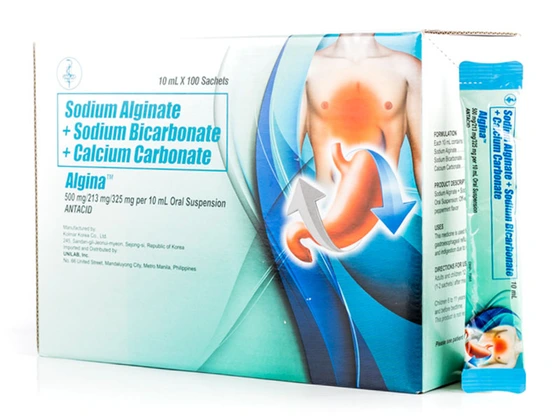While it's nice to feel warm and cozy at times — think curled up in thick blankets on a cold day — this can be a cause for concern when the sensation manifests as a burning and fiery feeling in your chest.
Although this can be a familiar feeling for some, heartburn (and other symptoms) doesn’t just show up because of an extra-heavy meal. This health issue is actually more complex than people think it is. Take a closer look at why and how heartburn happens, and how people can proceed with heartburn symptom relief right away.
Here’s Why This Unwanted Fiery Feeling Happens
Someone with heartburn often experiences chest pain alongside a burning feeling from within the body. Contrary to popular belief, this health issue doesn’t involve the heart, but mainly revolves around the digestive system.
Heartburn happens as a result of stomach acid flowing back to the esophagus, also known as acid reflux. This tube connects the mouth and the throat to the stomach, serving as a passageway for the food you eat. At its base is a muscle called the lower esophageal sphincter (LES) that acts like a security guard, letting food and liquids pass from the throat into the stomach. Once there’s no more food, the LES closes and says “no entry” to other unwanted substances. Unfortunately, there are times when this muscle doesn’t work properly or close all the way, resulting in stomach acid moving back up to the esophagus and triggering heartburn.
This process can trigger mild to severe heartburn, often occurring after lying down, bending over, eating a late dinner, or consuming certain foods (more on this later). The discomfort may last anywhere from a few minutes to several hours, usually easing once the stomach has emptied the last meal.
What Does It Mean if Heartburn Happens More Often?
Struggling with heartburn more often than you’d like? If you answered yes, it’s possible that you belong to some of the at-risk groups for this health issue, or your body is telling you something you might be unaware of. Some common risk factors linked to cases of heartburn include:
● Pregnancy: Hormonal changes during this period cause the LES to relax more often, leading to acid reflux. Moreover, the stomach feels additional pressure during the second and third trimesters to ensure the baby grows, resulting in more frequent cases of acid reflux and heartburn.
● Aging: The muscles, including the LES, sadly weaken as one ages. As a result, it is unable to effectively prevent acid reflux, resulting in more frequent cases of heartburn.
● Certain types of food: One’s diet can increase the risk of more frequent cases of acid reflux and heartburn. Known “trigger foods” for these health issues include large or heavy meals; spicy, fatty, or fried food; onions, citrus fruits, tomato-based products, peppermint, chocolate, alcoholic drinks, carbonated drinks, and/or caffeinated beverages.
● Being obese: The extra pounds in your body can raise pressure and volume in the stomach, potentially triggering acid reflux and heartburn.
● Cigarette smoke (including secondhand smoke): This substance causes the LES to relax, causing acid reflux and heartburn.
● Gastroesophageal reflux disease (GERD): Someone with this chronic health issue experiences acid reflux at least twice a week for multiple weeks, ultimately raising their risk for heartburn.
Hand-in-Hand With Heartburn: Watch Out for Other Symptoms
On top of chest pain and a burning sensation, other symptoms can appear alongside heartburn. These can include:
● Nausea
● Burping
● Presence of a sour taste in the mouth
● Regurgitation of food and/or liquid from the stomach:
● Bloated and/or full stomach
● Hiccups
● Worsened case of asthma
● Swallowing difficulties or feeling that a lump is lodged in the throat
● Chronic cough
● Sore throat
● Non-cardiac chest pain
Ideally, it’s important to act on these signs of heartburn and acid reflux right away, not just to relieve pain, but to prevent whatever’s causing these symptoms from worsening and ruining your day.
Don’t Ignore Warning Signs — Prioritize Relief for Heartburn ASAP
When your chest feels like it’s on fire, extinguish the burning sensation as soon as you can. You can do it anytime and anywhere with the help of Sodium Alginate + Sodium Bicarbonate + Calcium Carbonate (Algina™).
Prescribed by gut experts, this formula can help address signs of stomach acid reflux, which include heartburn, acid regurgitation, and indigestion in as fast as one (1) minute with an assist from these three key components:
● Sodium alginate: This substance creates physical barriers to separate acidic stomach contents. Moreover, it may help lessen episodes of acid reflux and address heartburn.
● Sodium bicarbonate and calcium carbonate: These antacids assist in neutralizing stomach acid and in relieving heartburn and indigestion.
Suggested use of Sodium Alginate + Sodium Bicarbonate + Calcium Carbonate (Algina™) for adults and children 12 years old and above is at one (1) to two (2) sachets (10 to 20 mL) taken after meals and before bedtime up to four times a day, or as recommended by a doctor.
Sodium Alginate + Sodium Bicarbonate + Calcium Carbonate (Algina™) is available online and in leading drugstores nationwide at a suggested retail price (SRP) of Php34 per sachet.
If symptoms persist, consult your doctor.
References:
https://my.clevelandclinic.org/health/diseases/9617-heartburn-overview
https://my.clevelandclinic.org/health/diseases/17019-acid-reflux-gerd https://www.ncbi.nlm.nih.gov/books/NBK482513/
https://www.mayoclinic.org/diseases-conditions/heartburn/symptoms-causes/syc-20373223
https://www.mayoclinic.org/diseases-conditions/gerd/symptoms-causes/syc-20361940
https://www.healthline.com/health/gerd/pregnancy
Source: PMDI, IQVIA SOLUTIONS PHILIPPINES, INC., reprinted with permission. Prescription data of brands under A02A - ANTACIDS ANTIFLATULENTS among GASTROENTEROLOGIST covering the
period: MAT December 2024 (January 2024 – December 2024).
ASC Ref No. U0027P090825A


